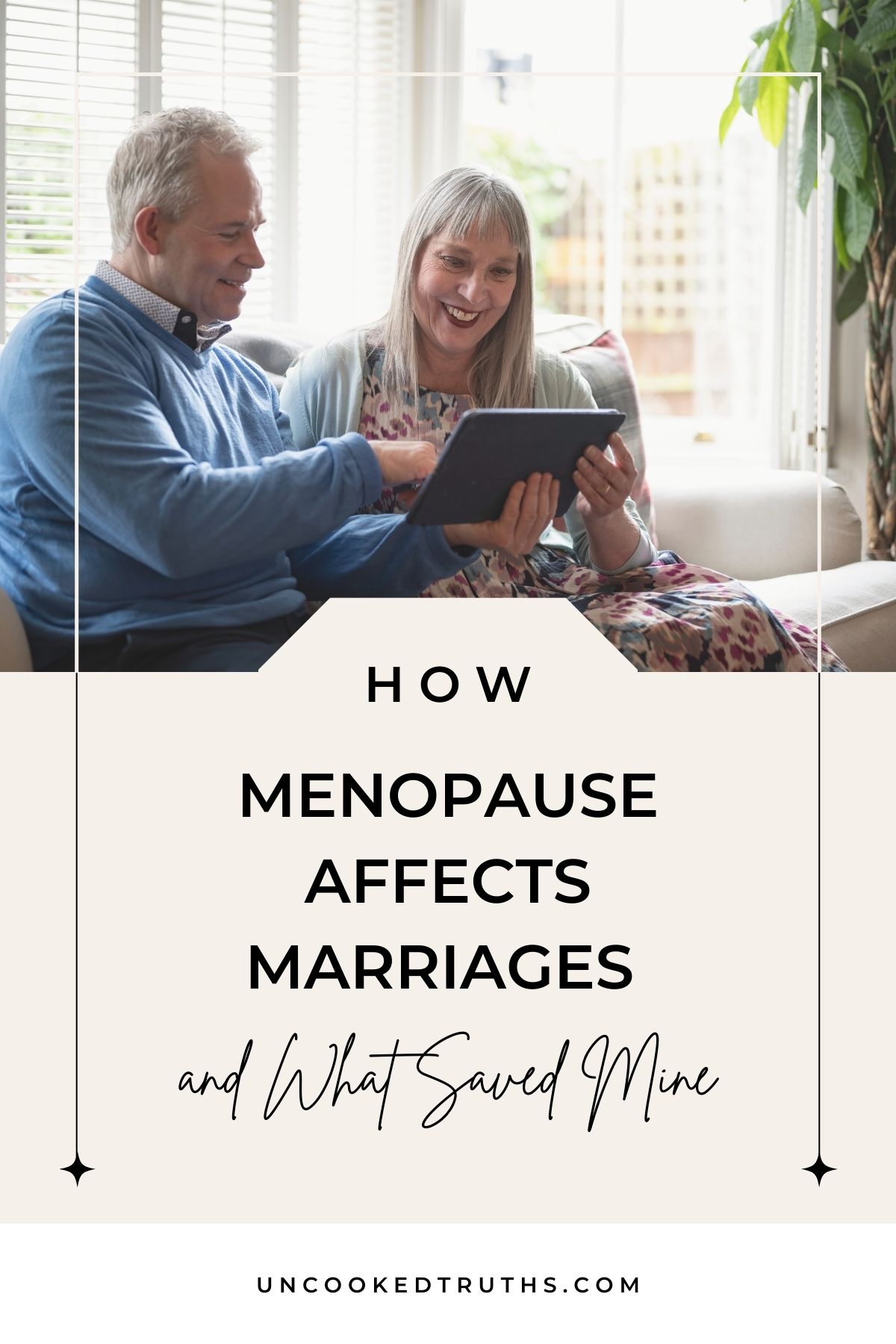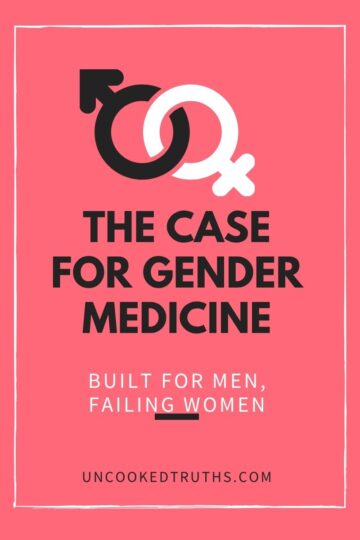When we talk about menopause, we usually talk about symptoms, hot flashes, insomnia, and brain fog. But what we don’t talk about enough is how it affects relationships, especially marriage.
When I met my husband, I was already on the runway to perimenopause. Not that I knew it. Not that he knew it. He met a woman in her late 30s who seemed, on the outside, healthy, driven, and emotionally steady.
By the time I turned 40, things started to unravel. Slowly. Quietly. And painfully. It took over a decade, countless appointments, more tears than I care to admit, and a mountain of self-education before we finally understood what was happening to me, and to us.
And that’s why I’m writing this: not as a medical expert, not as a doctor, but as a woman whose marriage survived midlife by the skin of its teeth, and by the grace of a husband who stayed curious instead of checking out.
Because let’s be honest: a lot of men leave.

Jump to:
- ❓ What Happens When You Don’t Know What’s Happening
- 💥What We Didn’t Know Almost Destroyed Us
- 📖 My story
- 🌡️When Menopause Finally Hit, It Took Everything With It
- ✨The Moment Everything Changed
- 💡 What Every Couple Needs to Know
- 📚 Recommended Reading: Books That Bridge the Gap Between Health & Partnership
- Final Thoughts
❓ What Happens When You Don’t Know What’s Happening
Menopause isn’t just a “women’s issue.” It’s a relationship earthquake. As a men, if you don’t know what’s going on, it looks like this:
- She’s angry all the time.
- She’s not sleeping.
- She doesn’t want sex.
- She’s crying over things that never used to bother her.
- She’s gaining weight.
- She’s forgetting everything.
- She’s tired of explaining, and tired of you not getting it.
And you only see:
- A wife who “changed”
- A woman who’s “let herself go”
- A marriage that feels like work, not joy.
If no one stops the cycle, it turns into resentment. Distance. Affairs. Divorce. Or silent, lonely marriages where two people sit in the same room but don’t actually see each other.
Read more: The Many Faces of Menopause: Symptoms No One Warned You About
💥What We Didn’t Know Almost Destroyed Us
For years, my husband didn’t understand what was happening to me. And I didn’t either. I was tired. Angry. In pain. Some days I couldn’t think straight. I didn’t feel like myself, and I didn’t know how to explain it without sounding like I was complaining.
He thought I didn’t love him anymore. I thought he was tuning me out on purpose. We were both wrong. The truth? We were in the middle of a hormonal storm, and we were trying to sail through it without a compass.
Looking back, I don’t think we could’ve avoided the rough patches. But we could have softened the blows if someone, anyone, had told us what perimenopause really is, how long it lasts, and how deeply it affects the mind, body, and marriage.
📖 My story
My husband met me at the tail end of my 30s, just as I was unknowingly entering perimenopause. Which means, truthfully, he never knew the real me. Not the one with stable moods, effortless energy, or a body that made sense. Neither of us recognized what it was.
We didn’t call it perimenopause. We didn’t even know to ask. But looking back, that’s exactly what it was, and it would go on to define the next 17 years of our lives.
It started with weight gain plus a resentment and resistance to my job. I hadn’t lost my cognitive abilities yet, but something was slipping. My focus, my stress tolerance, my ability to function in a rigid environment, they all crumbled.
I asked for support at work and got none. I couldn’t take the early alarms in the morning anymore, the race to catch the bus to get to work, the hours under fluorescent lights, sitting for hours. I never saw daylight, and I felt caged. So I left.
I quit my job and started a food blog, not because I had it all figured out, but because I was trying to survive. I needed something flexible, something of my own. My husband stood by that decision. He didn’t fully understand, but he knew I was trying to reclaim my sanity.
Not long after, I developed ovarian cysts. Not just one. Several. Painful and persistent. The medical system didn’t offer options, just fear and knives. I was told I should consider a hysterectomy. And while we’re at it, maybe remove the lymph nodes too, just to be safe. There was no proof of cancer, just hormones out of control, but the system just wanted to gut me rather than help me.
So I turned to homeopathy and acupuncture. It wasn’t ideal, but it was what I had. At least those practitioners listened. I trusted them more than my gynecologist, who never offered any hormone therapy to support my journey.
It felt like I was piecing myself together with duct tape while the medical world stood off to the side, shrugging. There was no conversation about hormones, treatment, or education about menopause.
My husband watched me in horror unravelling, emotionally, physically, and didn’t always know what to do. He was confused, quietly terrified, probably. But he didn’t run.
He cooked when I couldn’t. He took over the cleaning. He reminded me of things I forgot and handled parts of our life I simply couldn’t manage. He didn’t just witness what I was going through, he carried part of the weight.
We moved forward together, in a fog we couldn’t name.
🌡️When Menopause Finally Hit, It Took Everything With It
By the time I reached 52, we decided to move overseas. We needed a change. I thought maybe a new environment would help, maybe a different climate, a different culture, closer to family. But instead of relief, my body fully collapsed.
That was when I officially entered menopause, and all hell broke loose.
Insomnia hit hard. Not the kind where you toss and turn for a while and eventually drift off, I’m talking nights of sitting awake in the dark, sweating through my clothes, exhausted but unable to sleep. My body was on fire, inside and out. Hot flashes came every 20 minutes, or more often, all night long. I would finally doze off around dawn and wake up two hours later feeling like I had been hit by a truck.
Then came the frozen shoulder. The muscle pain. The stiffness. I had experienced chronic fibromyalgia for years, but now it was constant. Debilitating. My body was screaming, and no one could tell me why.
My husband and I blamed stress. The international move. The cultural transition. The change in climate. Anything but what it actually was. Because still—still—no one had said the word menopause in a way that explained any of this.
More: When Your Body Says ‘No Thanks’ to Exercise
I gained more weight. My blood pressure spiked. I developed insulin resistance and vertigo. And worst of all, I started to lose my words.
I couldn’t form sentences. Words I knew all my life I could not remember them. I would stand in the kitchen and forget why I walked in. As for the blog? Oh my, I couldn’t write anymore. I stared at my blog for hours and felt nothing. No spark. No drive. Just emptiness and brain fog so thick it scared me.
That’s when my husband sat me down and asked, gently but seriously, "Do we need to see a specialist? Are you aware that you can't think clearly anymore?"
He was scared. And so was I. For a brief moment, we both wondered if I had early-onset dementia. It sounds dramatic, but if you’ve been through it, you know it’s not. I looked at him and said, "If there’s no treatment for this, I don’t want to live like this anymore."
He didn’t flinch. He didn’t panic. He didn’t retreat. He held me. And then he went looking for answers with me.
✨The Moment Everything Changed
One day, scrolling on social media, I came across a short video of Dr. Mary Claire Haver talking about hormone therapy. She listed symptom after symptom, and it was like she had been watching me for the past ten years.
Hot flashes. Insomnia. Brain fog. Joint pain. Depression. Weight gain. Every word hit me like a revelation.
I ran to my husband. “I think I found the answer,” I said. Instead of brushing me off, he sat down beside me and listened.
We watched more. Read more. I found Dr. Heather Hirsch, Dr. Lisa Mosconi, Dr. Kelly Casperson, Dr. Felice Gersh, Dr. Noor Al-Humaidhi, Dr. Louise Newton, Dr. Rocio Salas-Whalen . We discovered a world of medical truth we had never been shown. He was furious at what had been hidden from women, and from the people who love them.
I finally found an endocrinologist who was a specialist in menopause and was willing to see and take me seriously. My husband came with me to every appointment. He listened. He supported me, fully and completely, with hope in his heart that I would come back to myself. We were both frustrated sometimes with the answers, but we had hope.
And slowly, I got better. Not right away, as it took time to stabilize myself, and I am still a work in progress, but I am getting better.
Read more: Menopause and Brain Fog: Why I Felt Like I Was Losing My Mind
💡 What Every Couple Needs to Know
This experience didn’t just change me. It changed us. We still have hard days. But the difference now is that we have language. We have tools. And, we have each other.
If you’re in a relationship right now where one of you is drowning in symptoms and the other doesn’t know what to do, here’s what I want you to know:
🧍♀️ For Women
- Speak up. Don’t wait until you’re falling apart to ask for help. Learn the symptoms; don’t wait until crisis mode. You’re not too sensitive, too emotional, or too needy. You’re going through a massive hormonal transition. And you deserve care.
- Share the information. Talk openly with your partner, even if it’s hard. He deserves to know. If you have children (and they are old enough to understand), talk to them and explain what you are going through. They will be better people when they grow up and will face the same situations.
- Don’t dismiss yourself: Get your hormones checked and advocate for real care. Change the doctors until you find the right answers. You deserve a conversation, and if the doctor is not educated, you need a better one.
- Continue to educate yourself. You will reach a point when you will probably know more than your doctor, and that's OK. Be your own advocate. They will not like it, they will maybe try to bully you, make fun of your knowledge, or even dismiss you. Again, find a better doctor.
- Bring the research to the appointments. Show them the advancements in science and research about menopause. The treatments today are not the same as 20 years ago. They are safer and better for you. And the most important, don't be afraid of the hormones your body made your entire life.
🧍♂️ For Men
- This is real. Hormones affect everything in her body, emotionally, physically, mentally, and sexually.
- It’s not personal. If she’s distant, tired, or short-tempered, it’s not about you; it’s about her body fighting a battle she didn’t sign up for.
- You can get through this. But not in silence. Not in denial. You have to educate yourselves and each other. This is not just her health journey, it’s yours too.
- Be curious, not defensive. Don’t assume your partner is “just moody” or “not interested anymore”. Learn with her. Read the books. Follow the experts. Sit next to her in the doctor’s office. She’s not pushing you away; she’s surviving. Help her come back. Ask questions. Listen. Offer help, not solutions.
- Stay. Don’t tune her out. Don’t disappear. Don’t assume this is the end. And understand this: she may not be functioning the way she used to, but that doesn’t mean she’s gone. Step in where you can. Help with the chores once in a while. Keep track of appointments. Be her second brain when she can't remember. Even small gestures tell her she's not alone. Stay physically and emotionally connected. It matters more than ever.
- Don't compare her to her younger self. Honor who she is now.
👥 For Both
- Intimacy may look different, but it can still be beautiful. Physical intimacy may need to evolve, not disappear.
- Therapy isn’t failure, it’s a tool, and it can help if the relationship feels strained.
- You’re both changing. Learn how to grow together. Keep the communication open.
- Celebrate wins together: better sleep, more energy, renewed closeness.
📚 Recommended Reading: Books That Bridge the Gap Between Health & Partnership
These books gave us the knowledge we needed to survive what no one warned us about:
1. The New Menopause by Dr. Mary Claire Haver: It provides the language and insight for partners to understand what’s happening emotionally and physically, and how to support it.
2. The Menopause Brain by Dr. Lisa Mosconi, PhD: When husbands understand that the changes are rooted in brain chemistry, support becomes less emotional guesswork and more compassionate partnership.
3. Unlock Your Menopause Type by Dr. Heather Hirsch, MD, MS, NCMP: It gives structure and a shared framework to the chaos. When both people understand the type, they can plan better and avoid frustration.
4. You Are Not Broken by Dr. Kelly Casperson, MD: Because sex and intimacy don’t die at 45, they just evolve. This book helps both partners unlearn shame and build a new, informed foundation for connection. No eye-rolling, no fluff, just science, empathy, and the occasional F-bomb.
5. The Menopause Manifesto by Dr. Jen Gunter: Straight-talking, myth-busting, and full of science-based insights. Perfect for anyone who likes facts with a side of fire.
6. Estrogen Matters by Dr. Avrum Bluming & Dr. Carol Tavris: A deep dive into why hormone therapy has been misunderstood, and why it can be life-saving.
7. The Definitive Guide to the Perimenopause and Menopause by Louise Newton: This book explains why women feel like they're falling apart, how to get proper treatment, and what partners can do to support them through the chaos. It’s not dramatic, it’s empowering. Read it together. Highlight it. Leave it on the kitchen table. It’s that good.
Final Thoughts
I got my life back because someone online dared to tell the truth. And I stayed married because my husband was willing to learn that truth with me. There are still days when he rolls his eyes at some new menopause research I bring up, but even then, he listens. He learns. He shows up.
He supported me when I couldn’t support myself. He carried the weight when I was too tired, too foggy, too broken down to function. He never asked for credit. But he deserves it.
Menopause nearly broke me. But we held on. And now I want to be one more voice saying what no one said to me: you are not broken. You are evolving. And if you walk through this together, you can come out stronger on the other side.
If you like this article, let me know. I am curious to know how you manage your symptoms and if your family supports you. Otherwise, here are some more articles to read:
- Why Is Hormone Therapy Treated Like a Dirty Word?
- MHT and Mounjaro: Finding Balance in Midlife
- Is This Normal?” And Other Midlife Body Mysteries
- The Guilt of Getting Better on GLP‑1s
- Breaking the Silence Around Hormone Therapy
- Menopause in the Workplace: Impact and Solutions
- Menopause Support for Husbands: What You Need to Know






Susan says
Beautifully written, Gabi. You have a lot of wise advice to give that is based on your tough experience. Keep it up!
Gabriela says
Thank you, Susan! I truly appreciate it!
Courtney Johnson says
Holy cow, yes, I liked this article! Thank you for your honesty!
Gabriela says
Thank you, Courtney!